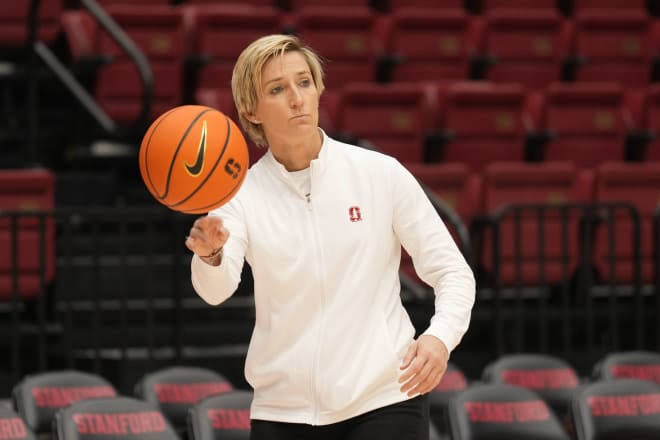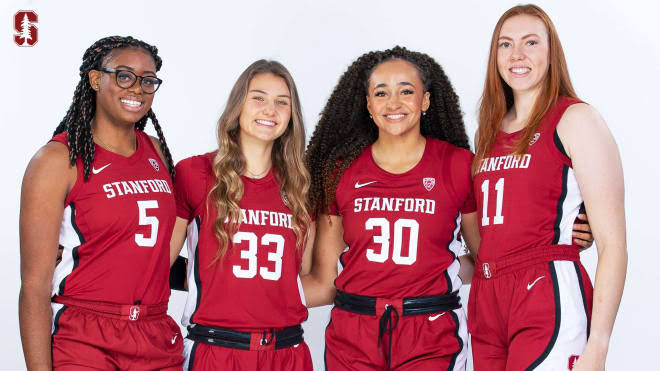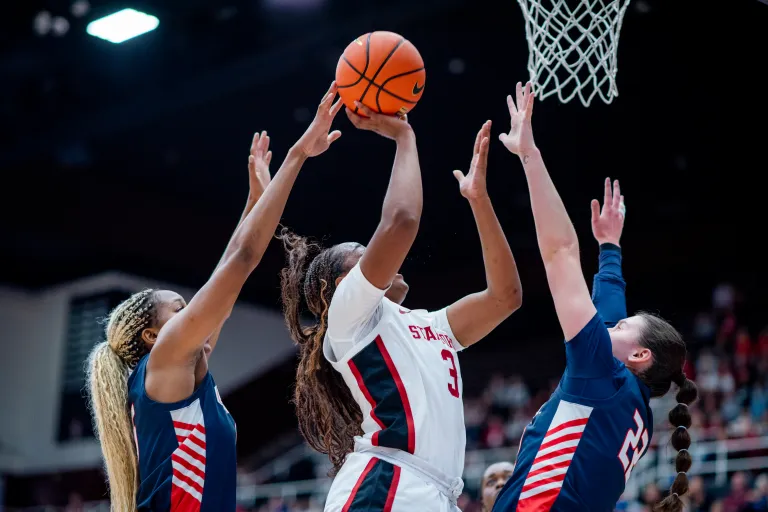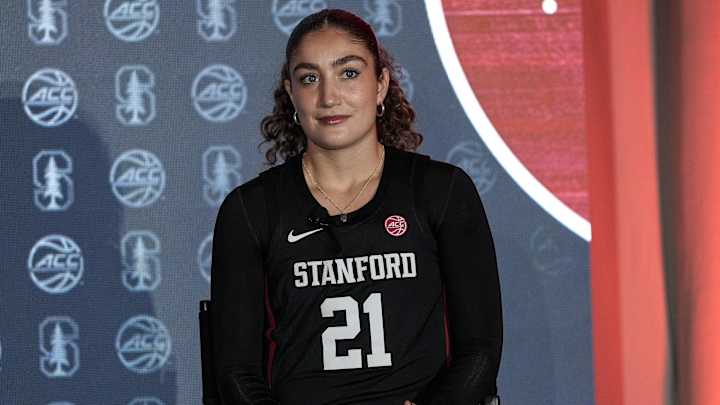In the dynamic world of collegiate sports, where lawsuits are reshaping the landscape and teams increasingly resemble professional leagues, coaching now demands a diverse skill set extending far beyond the court.
Fortunately for Stanford’s women’s basketball program, new head coach Kate Paye, JD/MBA ’03 (BA ’95), is uniquely equipped to navigate this evolving environment. Armed with advanced degrees from Stanford’s joint JD/MBA program, Paye brings a rare combination of expertise to her role in an era defined by name-image-likeness (NIL) deals, the transfer portal, and debates over athlete employment.
“She’s exactly where she needs to be,” says Tara VanDerveer, Stanford’s legendary coach who passed the torch to Paye last April after 38 years at the helm. “This is a challenging time, but Kate is the perfect person for the job.”
Paye, who spent 17 years as VanDerveer’s assistant, is modest about any advantage her academic credentials may offer.
“These are incredibly complex issues, ones that even seasoned lawyers struggle with,” Paye says. “But I think my strengths lie in processing information, solving problems, and creating effective plans.”
This knack for planning and perseverance has long been a hallmark of Paye’s journey.
A Stanford Story
Born at Stanford Hospital, Paye grew up steeped in the university’s athletic traditions. Both her parents were alumni, and her brother, John, was a quarterback and basketball guard for Stanford. Summers were spent at VanDerveer’s basketball camp, planting early seeds for her career.
As a standout basketball player at Menlo School, Paye rejected scholarship offers from other universities, opting instead to walk on to Stanford’s team.
“Other coaches would ask, ‘Don’t you want to go somewhere where you’re wanted?’” she recalls. “But I knew it wasn’t about what others wanted—it was about what I wanted.”
Her determination paid off. As a freshman, Paye won a national championship and earned a scholarship. By the time she graduated in 1995 with a degree in political science, she was primed for a professional basketball career
Balancing Law School and Pro Basketball
Paye joined the American Basketball League (ABL), which launched after the U.S. women’s basketball team won gold at the 1996 Olympics. But when the ABL folded three seasons later, Paye turned her focus to Stanford’s JD/MBA program, an aspiration inspired by her family’s legal background.
“Business school intrigued me because it was outside my comfort zone,” Paye explains. “I thought I might end up in sports management, maybe in a front office or as an agent. Coaching wasn’t on my radar.”
Accepted into the program before the WNBA called, Paye balanced law school with her professional basketball career, taking exams on the road while playing for teams like the Minnesota Lynx.
“She managed to juggle law school, business school, and pro basketball. That’s Kate’s bandwidth,” VanDerveer says.
At Stanford Law, Paye impressed her professors with her discipline and maturity.
“She was deliberate and measured in her discussions,” recalls William B. Gould IV, who taught her in sports and labor law.
After earning her dual degrees in 2003, Paye passed the California bar and joined Cooley Godward as a junior associate. But despite the firm’s welcoming environment, she quickly realized corporate law wasn’t for her.
“I woke up every morning wondering how I’d get through the day,” Paye says. “I’m a physical person. Sitting at a desk didn’t feel right.”
Returning to the Court
Taking another leap of faith, Paye left her legal career to coach college basketball. Within months, she landed an assistant coaching role at Pepperdine. Her sister Amy, also a lawyer, admired her bold decision.
“Some people spend decades in careers they dislike. Kate figured it out quickly,” Amy says.
After stints at Pepperdine and San Diego State, Paye received a life-changing call from VanDerveer. Initially hesitant, she ultimately returned to Stanford, where she remained a key part of the program for 17 years. During that time, she became the assistant head coach and prepared to take over when VanDerveer retired.
Life Off the Court
Throughout her coaching journey, Paye has demonstrated her remarkable capacity for balancing life’s demands. A single mother of two, she later married and expanded her family to include a third child.
“She’s got superpowers,” VanDerveer says with admiration.
The New Era
Now at the helm of Stanford’s women’s basketball program, Paye faces a sport transformed by NIL deals and the evolving role of student-athletes. The university is adapting by creating roles like a “director of student-athlete development” to manage off-court issues.
Despite these challenges, Paye is optimistic. Women’s sports are thriving, with growing audiences and opportunities.
“It’s an incredible time for women’s basketball,” she says. “It’s rewarding to have dedicated my life to this sport.”
Her sister Amy, reflecting on Paye’s journey, believes she would have excelled in any career.
“She’s a natural leader and motivator,” Amy says. “But basketball is her dream job—just on a different kind of court.”



